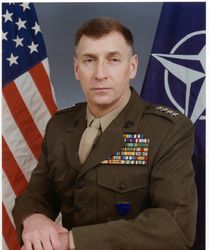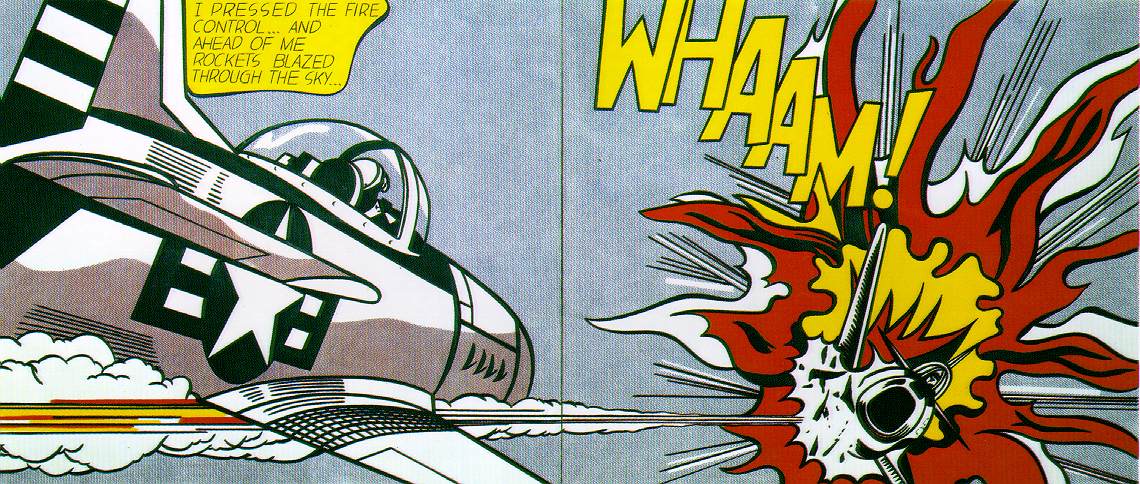mįn. 16.4.2007
Bush og nżstofnaš "strķšskeisara" embętti Hvķta Hśssins
 Seinasta śtspil Hvķta Hśssins ķ ęvintżralegri sigurgöngu žeirra ķ Ķrak er aš stofna embętti strķšskeisara, eša "War Czar". Hugmyndin er sś aš žaš vanti einhvern sem geti stżrt öllum strķšsrekstri Bandarķkjanna ķ bęši Afghanistan og Ķrak. The Daily Show hefur sennilega gert žessu mįli öllu best skil (žaš er hęgt aš horfa į upptöku af umfjöllun Jon Stewart og Jon Oliver į Raw Story:
Seinasta śtspil Hvķta Hśssins ķ ęvintżralegri sigurgöngu žeirra ķ Ķrak er aš stofna embętti strķšskeisara, eša "War Czar". Hugmyndin er sś aš žaš vanti einhvern sem geti stżrt öllum strķšsrekstri Bandarķkjanna ķ bęši Afghanistan og Ķrak. The Daily Show hefur sennilega gert žessu mįli öllu best skil (žaš er hęgt aš horfa į upptöku af umfjöllun Jon Stewart og Jon Oliver į Raw Story:
So there you have it, folks: five years into the global war on terror, the President believes it is now time for someone to be in charge of it.
Af lestri bloggsķšna og fréttaskżringa viršist sem žessi skošun sé nokkuš rķkjandi, og ef strķšskeisaraembęttiš įtti aš vera PR-stunt žį hefur žaš lķklega misheppnast. En žessi frétt er mjög merkileg, fyrir nokkurra hluta sakir, og óžarfi aš afskrifa žessa hugmynd alveg strax. Žaš er af nógu aš taka: af hverju her "keisara"? og hvaš varš um embęttiš "commander in chief"? Gerir stjórnarskrįin ekki lķka rįš fyrir embętti sem hefši endanlegt śrskuršarvald og gęti sętt deilur milli rįšuneyta og samręmt störf žeirra? Mig minnir aš žaš sé meira aš segja haldnar kosningar į fjögurra įra fresti til žessa embęttis?
Žaš sem hefur žó vakiš mesta athygli er aš forsetanum hefur ekki tekist aš finna neinn til aš taka žetta starf aš sér. Žaš er ekki į hverjum degi sem jafn hįttsettar stöšur eru stofnašar og enginn vill fį heišurinn af žvķ fį keisaratitil. Fred Kaplan į Slate:
Let's be clear about the significance of these refusals. Generals do not become generals by being demure. They are, as a rule, confident, opinionated, and in many cases, arrogant. Retired generals like to talk with other retired generals about how they would handle one foul-up or another if they were still in command.
In other words, if some retired generals out there had a great idea about how to solve the mess in Iraq, and if the president offered them the authority to do what they wanted to do, few of them would hesitate to step up and take charge.
The fact that Bush has found no takers suggests one of three possibilities: The generals don't have any great ideas; they don't believe they'd really be given carte blanche; or, most likely, to some degree, both.
Kaplan bendir į aš žessi herkeisari Bush sé ekki fyrsta keisaraembęttiš sem bandarķkjaforsetar hafa stofnaš til aš takast į viš erfiš vandamįl. Fręgastur er aušvitaš eiturlyfjakeisaraembęttiš sem Ronald Reagan stofnaši - og žaš žarf sennilega ekki aš segja mikiš um hversu įrangursrķkt žaš embętti hefur reynst. Ef vandamįliš er óleysanlegt er augljóst aš žaš breytir engu hvort skipašur er "keisari" til aš leysa žaš, og eins og Kaplan bendir į, žessi "czar" embętti öll hefur skort vald eša umboš til aš móta stefnu - hlutverk žeirra er aš samręma störf annarra stofnana svo hśn samręmist betur stefnu stjórnarinnar:
...they're not given the power to set policy. If the president doesn't have a sound policy, the most efficient coordinator can't solve anything important.
Žeir herforingjar sem stjórnin hefur leitaš til fram til žessa viršast allir vera žeirrar skošunar aš žaš sé ekkert sem žeir geti gert til aš leysa įstandiš ķ Ķrak. Best žekktur žeirra herforingja sem hefur hafnaš tilboši forsetans er John Sheehan, en hann skrifar langa grein ķ Washington Post ķ dag. Śtskżringar hans eru merkilegar m.a. vegna žess aš žęr veita innsżn ķ hvernig hęst settu og reyndustu herforingjar Bandarķkjanna upplifa strķšsrekstur žeirra Bush, Cheney og Rumsfeld.
... after thoughtful discussions with people both in and outside of this administration, I concluded that the current Washington decision-making process lacks a linkage to a broader view of the region and how the parts fit together strategically. We got it right during the early days of Afghanistan — and then lost focus. We have never gotten it right in Iraq. For these reasons, I asked not to be considered for this important White House position. These huge shortcomings are not going to be resolved by the assignment of an additional individual to the White House staff. They need to be addressed before an implementation manager is brought on board.
Sheehan segir vandann liggja ķ žvķ aš forsetinn og stjórnin hafi enga heildstęša strategķu eša sżn varšandi Ķrak eša Miš-Austurlönd, og ólķk markmiš stjórnarinnar stöngušust į:
What I found in discussions with current and former members of this administration is that there is no agreed-upon strategic view of the Iraq problem or the region.
... Simply put, where does Iraq fit in a larger regional context? The United States has and will continue to have strategic interests in the greater Middle East well after the Iraq crisis is resolved and, as a matter of national interest, will maintain forces in the region in some form. The Iraq invasion has created a real and existential crisis for nearly all Middle Eastern countries and created divisions among our traditional European allies, making cooperation on other issues more difficult. In the case of Iran, we have allowed Tehran to develop more policy options and tools than it had a few years ago. Iran is an ideological and destabilizing threat to its neighbors and, more important, to U.S. interests.
Möo: Forsetinn hefur ekki haft heildstęša utanrķkisstefnu eša strategķu ķ Ķrak, og Sheehan gagnrżnir stjórnina fyrir aš hafa breitt yfir žetta meš žvķ aš slį um sig meš frösum og klisjum:
The day-to-day work of the White House implementation manager overseeing Iraq and Afghanistan would require a great deal of emotional and intellectual energy resolving critical resource issues in a bureaucracy that, to date, has not functioned well. Activities such as the current surge operations should fit into an overall strategic framework. There has to be linkage between short-term operations and strategic objectives that represent long-term U.S. and regional interests, such as assured access to energy resources and support for stable, Western-oriented countries. These interests will require a serious dialogue and partnership with countries that live in an increasingly dangerous neighborhood. We cannot "shorthand" this issue with concepts such as the "democratization of the region" or the constant refrain by a small but powerful group that we are going to "win," even as "victory" is not defined or is frequently redefined.
Grundvallarvandamįl Bush stjórnarinnar, ķ žessu, lķkt og öllu öšru, viršist vera aš forsetinn heldur aš starf sitt sé pólķtķk - en ekki aš stjórna stóru rķki og leysa vandamįl. Pólķtķkusar slį um sig meš frösum og slagoršum mešan žeir eru aš sękjast eftir atkvęšum almennings. Žaš er hęgt aš vinna kosningar og ręšukeppnir meš žvķ aš kunna aš raša saman slagoršum og frösum og snśa śt śr fyrir andstęšingunum. En žaš er ekki hęgt aš sigra strķš meš slagoršum og śtśrsnśningum - og žaš er ekki hęgt aš stjórna löndum meš PR einu saman.
M
Meginflokkur: Ķrak | Aukaflokkar: Bush, lönd sem heita "stan", Stjórnmįl og samfélag | Facebook


Bęta viš athugasemd [Innskrįning]
Ekki er lengur hęgt aš skrifa athugasemdir viš fęrsluna, žar sem tķmamörk į athugasemdir eru lišin.